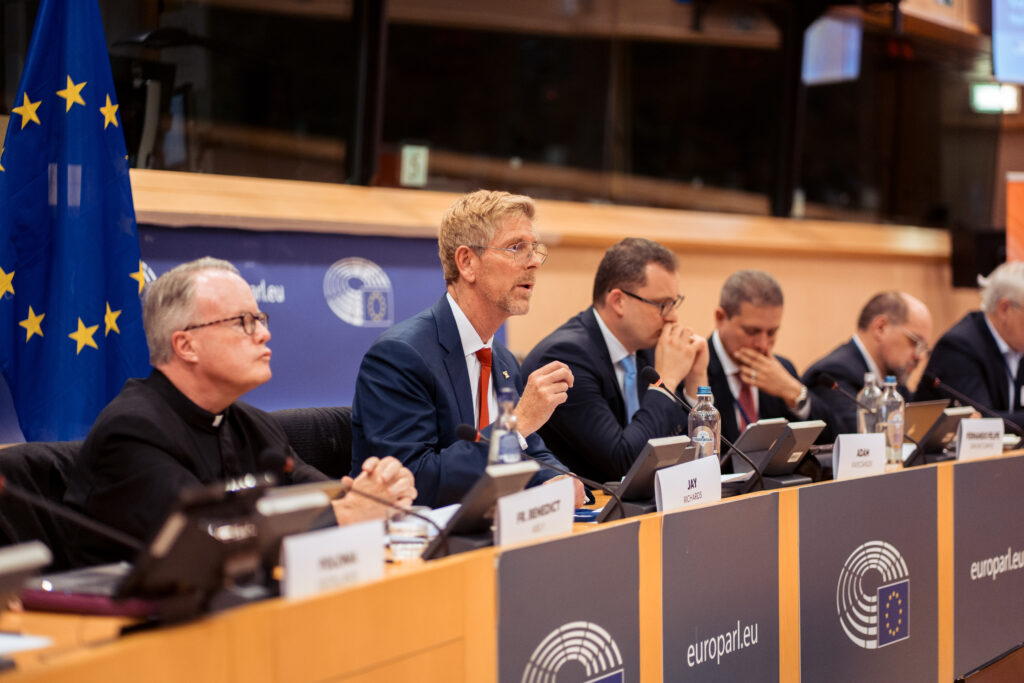This investigative work had been supported by the Centre for Investigative Journalism
The European Parliament voted on Thursday (13 November) to significantly dilute key elements of Europe’s climate agenda.
Lawmakers took aim at the Corporate Sustainability Reporting Directive (CSRD), which requires large firms to look beyond financial metrics and disclose their sustainability and human rights records.
Passed in 2022, the CSRD introduced major transparency obligations, requiring companies to quantify their direct climate impacts and those of their supply chains. The ultimate goal was to force firms to demonstrate how they are helping to meet the EU’s climate objectives, and the global goal of limiting warming to 1.5°C.
Originally, the new rules applied to companies with €50 million turnover and more than 250 employees. They were not designed to apply only to corporate giants.
However, following last week’s vote, the parameters have shifted. The CSRD will now only cover companies with more than 1,750 employees and €450 million in turnover – an outcome pushed by right-wing parties, corporations, and U.S. lobbyists.
Yet, following the intense parliamentary proceedings last week, another threat to the CSRD has gone unnoticed – that sustainability audits may be greenwashed by corporate consultancies.
The CSDR Market
Although the CSRD now applies to a limited number of firms, it represents a potential auditing revolution – forcing corporate giants to lift the lid on their sustainability performance and providing new tools to hold them to account.
Yet concern is already mounting that this revolution could be quietly undermined by powerful vested interests – chief among them, the world’s largest financial consultancies, known as the “Big Four.”
Deloitte, EY, KPMG and PwC dominate the global auditing business, with a combined annual turnover exceeding £160 billion. These firms already verify the accuracy of companies’ financial statements and ensure compliance with accounting standards. Now, they are poised to profit from the EU’s new environmental auditing market, that was estimated to be worth around €4 billion before the 13 November vote.
An analysis by the French news agency AEF in January found that nearly all of the country’s 40 biggest public firms (the CAC 40) have chosen the same auditors for both financial and CSRD reporting.
Another study of more than 600 early CSRD reports across the EU reached the same conclusion: nearly 90 percent of audits were conducted by the Big Four: PwC (28 percent), EY (24.3 percent), KPMG (20.5 percent), and Deloitte (17 percent).
The Big Four claim this dominance reflects their unrivalled expertise in financial auditing, which can ensure rigorous, cost-effective sustainability reporting. They also benefit from existing relationships and access to data within major corporations – allowing them, they argue, to deliver faster and cheaper results.
“There is the underlying idea that ‘I’m not going to entrust confidential information to a firm with only 10 employees.’ There are threshold effects, and it’s difficult for small firms to overcome them,” said Abrial Gilbert-d’Halluin, an ex-political advisor to Pascal Durand, who led the European Parliament’s negotiations on the legislation from 2020 to 2022.
Subscribe to our newsletter
Stay up to date with DeSmog news and alerts
Fears of Greenwashing
For critics, however, these arguments are a smokescreen.
Many fear that the Big Four will greenwash sustainability audits by applying their data-led mindset to climate reporting at the expense of a more systemic, qualitative understanding of environmental impacts.
There’s growing concern that sustainability reporting could be reduced to a set of narrow technical indicators – numbers detached from the real-world outcomes they are meant to measure.
“If we want to assess the efforts made by a company to decarbonise, it is not enough to read and analyse numbers. We also need to understand the decarbonisation processes themselves and how they are implemented in order to evaluate them meaningfully,” said Marc Boissonnet, Environmental, Social, and Governance (ESG) director at TIC Council, an international association representing independent testing, inspection and certification companies.
A broader, qualitative approach would also reflect the spirit of the CSRD, which requires companies to assess not just their direct climate impact but that of their entire value chain.
Political Pushback and Corporate Lobbying
Implementation of the CSRD has not been smooth.
The EU has faced lobbying from abroad – including from China and U.S. think tanks close to President Donald Trump – aimed at preventing foreign firms from being held accountable under the new rules.
In October, after months of pressure, the European Commission announced it would postpone reporting obligations for non-European companies, originally scheduled for June 2026, to an undetermined date.
The logic behind the CSRD was clear: amid accelerating global heating, governments should hold corporations and their financiers responsible for their role in the crisis. Yet, as the academic Jezabel Couppey-Soubeyran has argued, “the exact opposite is happening.”
This played out on 13 November. In addition to significantly reducing the number of companies affected by the CSRD, MEPs decided to remove the obligation on firms to implement a climate transition plan and comply with the 2015 Paris Agreement.
This is not the first attempt to dilute the legislation. Gilbert-d’Halluin, who first tracked lobbying around the CSRD in 2022, recalls that the objective of the legislation initially was to “move away from this financial vision of sustainability”.
“This would have pushed the market to decentralise and move away from an oligarchy, but we didn’t reach what was needed to make that fully possible,” he said.
The same year, Pascal Durand proposed that two separate auditors be required in a company’s annual report – one to assess financial performance and another for sustainability. The aim was to curb the influence of financial auditors over environmental reporting. But member states resisted, and the measure was dropped.
Another proposal suggested that sustainability audits could be conducted by independent third-party bodies (OTIs). Yet, since the CSRD’s adoption, only a handful of countries have opened their markets to these potential competitors.
Conflicts of Interest
The Big Four’s dominance raises profound conflicts of interest. These firms not only audit corporate sustainability claims but also advise companies on business strategies – creating a built-in incentive to downplay the environmental impact of their own recommendations.
Worse still, the Big Four are often involved in shaping the very rules that govern their work. Take the European Financial Reporting Advisory Group (EFRAG), which advises the European Commission on standard-setting.
One EFRAG employee told DeSmog: “There are many people from the Big Four who are tasked with developing standards alongside their main activities. For me, this a conflict of interest.
“Firstly, they have the opportunity to influence the development of standards they will later use in the auditing process. Secondly, they use it to expand their sustainability expertise, which they then sell back to companies during the CSRD process.”
Moreover, the language of auditing itself has been written in the Big Four’s image, leaving few others able to compete.
“What they do is very technical and nobody else really understands what climate accounting is,” said Josef Baumuller, a researcher at the Vienna University of Technology.
“The real problem is their predominance everywhere,” added Philippe Diaz, a former EFRAG member. “Why on Earth do we let corporations rule the world?”
Subscribe to our newsletter
Stay up to date with DeSmog news and alerts






